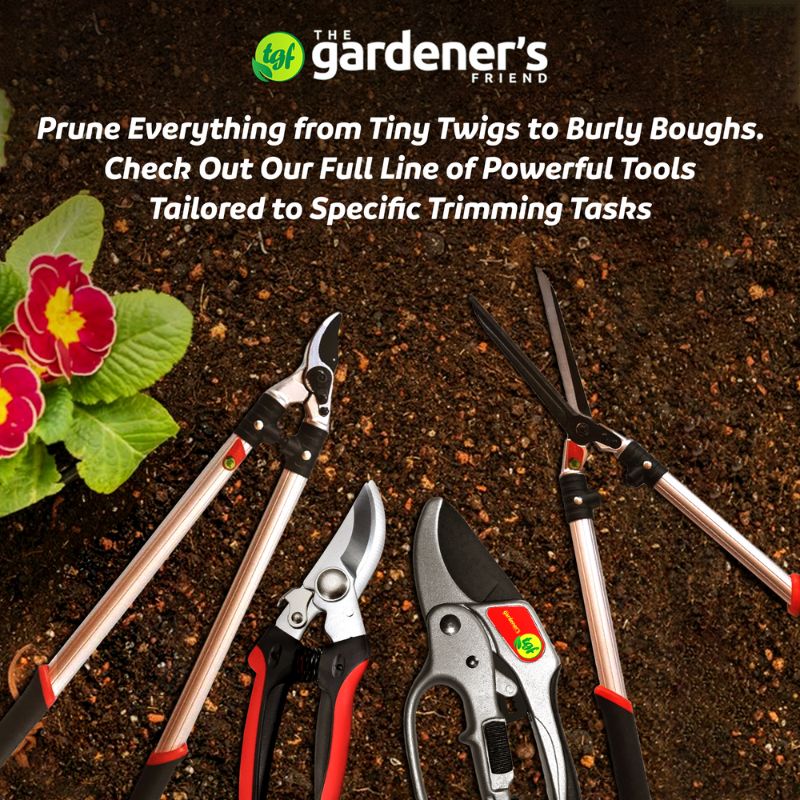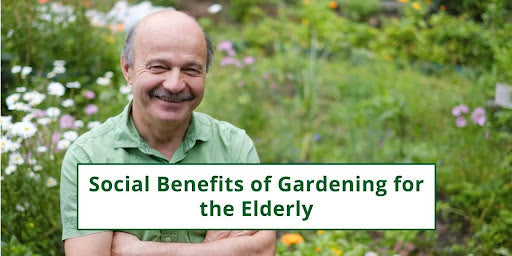Many people imagine later stages as the golden years of their lives, but for many older adults, this period brings a difficult challenge: Social isolation and loneliness.
Did you know that poor physical and mental health often increases the risk of cognitive decline and heart disease?
The good news? The antidote to isolation isn’t complicated; it could be a patch of earth that brings you closer to people you like socializing with.
For the elderly, gardening is far more than a hobby; the act of cultivating life is a powerful way to build social connections and improve one's overall well-being.
Let’s dig into the social benefits of gardening for the elderly.
1. Fostering Community and a Shared Purpose
The magic of gardening often lies in the shared experience; when you step into a garden, especially a communal one, you’re joining a built-in, close-knit community.
The Power of Community Gardens
Community gardens, whether they’re in a dedicated space within a retirement facility or a neighborhood park, are perfect for social interactions.
They provide a common ground for elderly gardeners who may never have crossed paths otherwise. The gardening tasks you perform in community gardens encourage social interaction:
- Collaborative Tasks: Working together on tasks like turning compost or coordinating watering schedules naturally act as conversation starters
- Shared Knowledge & Mentorship: Seniors who’ve been gardening for years are an invaluable source of knowledge and insights. Getting advice from other gardeners helps you learn practical skills; giving valuable advice reinforces a sense of self-worth and purpose
2. A Powerful Antidote to Loneliness

Social isolation is a prominent mental health challenge faced by the elderly. Gardening provides a simple, repeatable structure for engagement that directly addresses this issue.
The Reliability of Scheduled Interaction
Gardening sessions in regular time slots in a community space allow you to interact with other gardeners on a predictable schedule.
These scheduled gatherings break the monotony of the gardening exercise. Plus, knowing a friend or acquaintance will be there to help you with a specific task provides another reason to participate and stay consistent.
Built-in Conversation Starters
If you struggle with initiating conversations or are shy by nature, a gardening session can serve as an icebreaker.
You can talk about the work at hand, what’s going on in your life, and anything that makes you feel better.
Gardening lets you start with low-pressure, tangible topics that make interaction easy; it could ease your anxiety and pave the way for deeper relationships.
The Pride of Contribution
Another social benefit of gardening is the renewed sense of purpose. It provides a platform to grow something that adds value and sparks meaningful conversations.
For instance, you could give your neighbor a bouquet of hand-grown flowers or bring a box of fresh bell peppers to the family dinner.
You May Also Like: Emotional Benefits of Gardening for the Elderly
3. Strengthening Intergenerational and Family Bonds

Gardening bridges age gaps, allowing you to build stronger bonds and memories with younger generations.
Hands-On Activity with Grandchildren
There’s no better way for an elder to spend time with a grandchild than getting their hands dirty. Gardening is a low-impact, refreshing activity; it provides a structured way for different age groups to connect.
It can be perfect for knowledge transfer; children can learn where food comes from. Grandparents can teach them the value of patience and care.
Gardening is a kind of social activity where the focus isn’t on conversations; it’s on the seed, the soil, and the water. The interaction often comes as a refreshing byproduct.
Shared Responsibility and Quality Time
A small, personalized garden project can become a shared responsibility. It makes sure you spend quality time with your family regularly.
For instance, your son, daughter, or grandchild can visit you every Saturday to help you with heavier digging, while you handle relatively delicate parts of the process.
Practical Tips for Getting Started

The most important step? Just start. Here are some powerful ways to make gardening socially rewarding, especially if you’re a senior:
- Start Small with Containers: Container gardening is a great alternative to traditional gardening if space or mobility is an issue. Even a few pots of herbs or succulents are enough to turn your gardening sessions into tiny social events
- Seek Local Groups: Look for neighborhood community gardens, horticultural therapy initiatives, and local senior center programs.
- Invest in Adaptive Tools: If you’re dealing with a mobility issue or a condition like Arthritis, don’t let physical limitations be a barrier. Use long-handled, lightweight tools. Rolling garden seats, raised garden beds, and kneeler benches can make your work a lot easier
Frequently Asked Questions (FAQ)
What are the Social Benefits of Community Gardens?
Community gardens create a shared space where seniors can interact, exchange knowledge, and collaborate on different tasks.
Why are Social Activities Important for the Elderly?
Social activities can improve mental and physical health in seniors. They can help you combat loneliness and reduce the risk of depression and dementia.
Why Do Older People Garden?
Seniors garden because it offers several benefits, including therapeutic relaxation and a strong sense of purpose. It also lets you exchange knowledge and engage socially in a low-impact environment.
Does Gardening Need to Be Outdoors to Offer Benefits?
No, it doesn’t need to be outdoors; indoor container gardening with herbs or succulents also provides similar sensory stimulation. It’s a more accessible social activity for seniors who don’t have a full-fledged garden to socialize in.
Conclusion
Gardening is truly more than just a hobby; done right, it’s a great way to stay connected in this screen-heavy age.
If you’re an elder (Or know someone who is) and want to benefit from gardening, start small. You don’t need a huge garden; just a few plants or herbs on your balcony are enough to start conversations.
Alternatively, consider joining community gardens. Use lightweight, long-handled tools and leverage raised garden beds for added comfort.
All in all, gardening is a perfect way for older adults to combat loneliness, strengthen community bonds, and nurture their sense of self-worth.
Read More: Intellectual Benefits of Gardening for the Elderly


